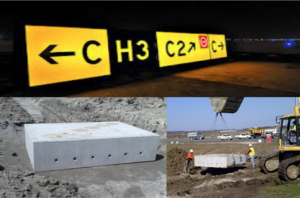Our latest precast concrete delivery includes a product installed near planes, weighs approximately 16 tons, and saves the contractor and airport a lot of time, instead of cast-in-place concrete construction.
This is just one of many Junction Can Plazas installed at Detroit Metropolitan Airport.
When a light goes out at home, a quick bulb change usually fixes the problem. On an airfield, it’s rarely that simple. A vast system of underground power ensures that electricity is fed to critical runway lights & directional signs for pilots during take offs and landings. Conduit, grounding, and cabling is housed in multiple concrete Junction Can Plazas, shown above. The openings on each side of the precast concrete foundation allows cable to be joined in an intricate pattern under the taxiways and runways, bringing power up through each round “can”, so electricity can be networked to lighted directional signs. You can see the 6 plywood circles on top of foundation, protecting the top of each galvanized steel power can. On past projects, these concrete JCP’s were cast-in place on the airfield, causing contractors to wait for form set-up, concrete delivery, adequate concrete cure, and form removal. Inclement weather causes construction delays. Liquidated damages can be steep during airport runway reconstruction; as much as $500 PER MINUTE for delays to the re-opening. Advance Concrete Products Co. saves contractors time and money by casting precast concrete Junction Can Plazas (JCP’s) inside a climate-controlled factory environment, storing them until the contractor is ready to take delivery. We don’t just think of our precast concrete Junction Can Plazas as 16 tons of concrete block, we think of them as 16 tons of critical power.



